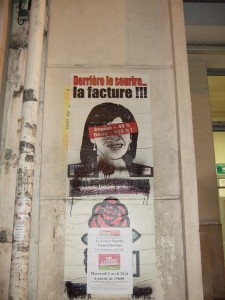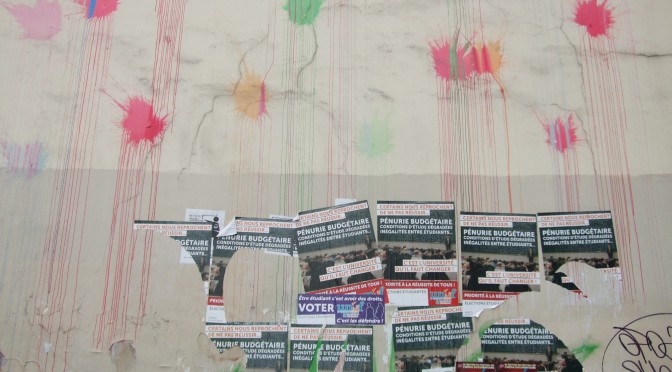I’m the first to admit I’ve been on a temporary hiatus from the UCWbLog sphere. While everyone at DePaul was suffering from finals, I was scrambling to study for midterms after spending the weekend in Madrid, the European city that never sleeps (and drinks more Sangria than water).
I dreaded my European politics midterm the most. As an English major, the history of political theory – especially concerning the most complicated continent in the world – seemed a bit esoteric at first. Nevertheless, thanks to DePaul’s marvelous Gen Ed requirements, I’m taking two politics classes in my non-native language, one of them being political philosophy at an outside university.
Yet all this new information has served me well in France. With the second “tour” of the municipal elections this past Sunday and President Hollande’s alleged affair a few months back, it’s safe to say that Paris has been politically charged – well, more than usual. If anything, the campaign posters and the news segments following politicians have only ignited the political dynamism already engrained in Parisians’ daily lives.
The countless “manifestations,” or rallies/protests, are testament enough, even if the participants sometimes resemble a clueless horde at an amusement park more than citizens exercising their civic duty.
At the same time, having a solid base of political vocab and a cognizance of current events in France has been dangerous for me. Known as “sassy” or “outspoken” among friend and peers, my tendency to spit fire has already left me burnt more than once.
For example, at the Conversation Club a few weeks ago, one of the assistants at IES, a native Parisian, asked us what our first impressions were of French politics upon our arrival to France. She was conducting a survey for one of her sociology classes on how Americans and other foreigners adjust to life in Paris.
Because blatant honesty is my MO, I explained how I used to think, stereotypically, that the majority of people in Paris were left-wing because of their socialist status, especially in terms of cultural and humanitarian issues. I told her how soon my idea of Paris as the liberal city on a hill was debunked by protests against same sex marriage and the numerous conservative jabs I’d encounter daily.

If that didn’t do the trick, the results of the first round of elections surely dismantled my theory: the extreme right, Le Front National, gained significant ground, even winning the mayoral position in a few cities throughout France. It’s obvious the French are disenchanted with their economic situation, but I digress.
Yet my French peer was not amused. Though I tried to explain that this news was both enlightening and unsettling, she responded defensively. She argued that the prominent liberals in the States, notably Obama, are considered conservative in France, and I’m still not sure how that constitutes a response to what I said.
This whole exchange went down in French, which means that 1) I probably offended her with some sort of linguistic nuance that doesn’t translate, and 2) She had the upper hand; she decided where the conversation went. Even though I wanted to continue the discussion, she drowned out all of my attempts at retribution with a full-on French rebuttal, all of which of sounded as calm as a waterfall.
Not to worry – living in Paris, I’ve developed an ice-pack like exterior, one that protects me from stubborn Parisians and soothes all my linguistic shame. Discussing politics is a delicate affair even in a native language, but I have come to accept the “frankness” of the French as an invitation.
If native speakers in French use a tactfulness – a sort of banter – in discussing politics, then I use my linguistic deficit as an excuse not to fear how they’ll react to what I say. The results are about as surprising as Marine Le Pen’s victories.
Most of what I discuss at the dinner table with my host family is politics, especially due to the fact that we watch the news together every night. Yes, I cringed when a member of my host family tried to justify her conservative views on gay marriage, but I did assert my own belief, in a polite and collected way, after she had finished speaking.
As an outsider, the key is to know your boundaries and tread lightly; nevertheless, don’t hesitate to enter the discussion. After all, if you offer no opinion, then you seem uninformed and therefore boring – indubitably worse than being possibly offensive.
In some cases, it’s better to keep your mouth shut, like with an employer. I sat there quietly when my boss expounded on the audacity of those reliant on the welfare system. But in any culture, as a lowly intern, stifling your political views in the workplace may be a good rule of thumb.
It seems like all of the American students have dealt with some sort of culture shock in regards to politics here in France. Initially, the French brashness is uncouth and unexpected for us, like the first time they lean in to do “la bise.” Yet, unlike “la bise”(or like, depending on what your style is), it’s still upsetting in certain contexts.
However, for the most part, their honesty is refreshing. They flesh out any awkward tension right away, which allows you the chance to forget about it later.
Let’s compare political disagreement to the infamous Gustave Courbet painting at the Musée D’Orsay, “Origine du Monde.” Instead of shuffling around, acting as if they don’t see it, the French prefer to stare at it and deal with it directly: either bask in its glory or move on.
*Disclaimer: I have no idea if this is how French people react to this painting. I can only assume they’d be less sensitive to it due to the amount of times my French professors have deemed Americans “prude” or have discussed sex, nudity and the like without the slightest hint of pink gracing their cheeks.*
.
Discover more from UCWbLing
Subscribe to get the latest posts sent to your email.

